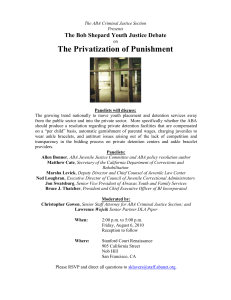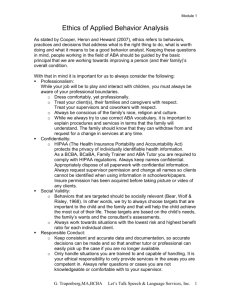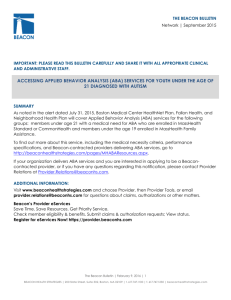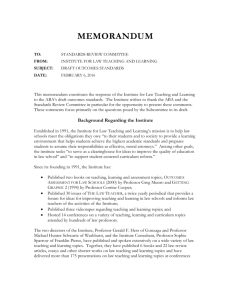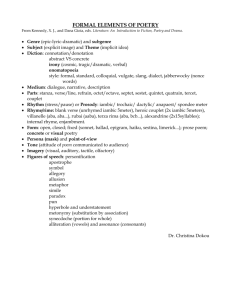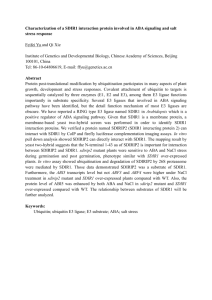Combined POAC Aug 11 - POAC-NoVA
advertisement
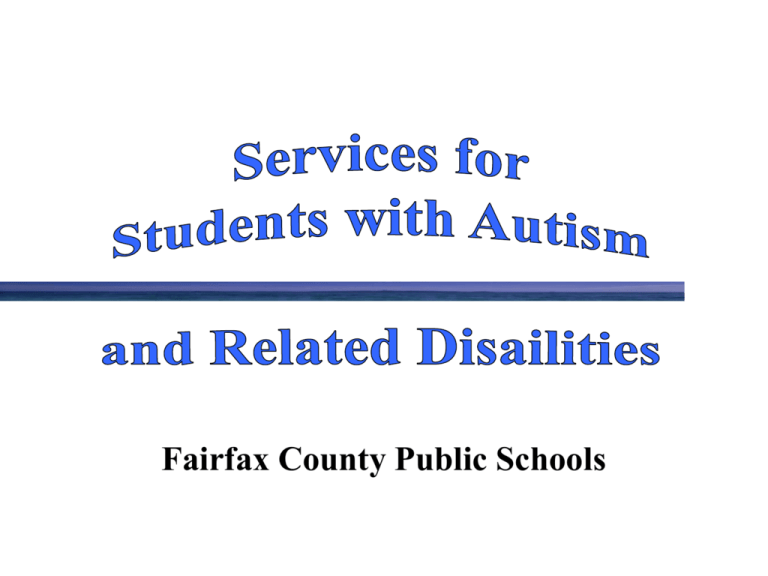
Fairfax County Public Schools Curriculum • General Education Curriculum • SOL and FCP Program of Studies (POS) goals and objectives • With accommodations to address areas of need as defined in the IEP • Curriculum adapted as needed • Foundations courses in HS • Life Skills Curriculum • Individualized skill-based curriculum • Aligned with state assessment objectives • Goals and objectives outlined in the IEP Life Skills Curriculum Framework • Aligned Standards of Learning (ASOL) • Functional Academics • Independent Living Skills • Career Development • Behavior, Communication, Fine Motor and Gross Motor • Community Based Instruction (CBI) Curriculum Focus • Literacy and math • Social and communication skills • Inclusive opportunities • Generalization of skills into practical daily living activities State Assessment • Participation in the Virginia Assessment Program (VAS) is required • SOL tests • VGLA, VSEP (HS only) • Virginia Alternate Assessment (VAAP) Annual Assessment • Criterion-based assessments using standardized instruments • Brigance Assessments • Early Development II (Yellow) • Comprehensive Inventory of Basic Skills (Green) • Life Skills Inventory (Blue) Staff Training • Student-focused intervention • Classroom organization and structure • Behavior management • Curriculum across content areas and domains of learning • Instructional strategies/practices • Assessment/data collection Preschool Autism Classes and Enhanced ABA Elementary Services What is ABA? ABA is Applied Behavior Analysis APPLIED • The application of the theory, principles, and procedures of behaviorism to problems of human behavior in natural settings BEHAVIOR • Concerned with observable phenomena ANALYSIS • Deals with objective measures of intervention and change What is ABA? • ABA is… • a science based on learning theory • a set of systematic procedures derived from behavioral principles to improve socially significant behaviors • a methodology used to modify behaviors and to teach skills to children, adolescents, and adults of ALL functioning levels ABA Enhanced Services include: Services: • Comprehensive training plan for all staff • Low staffing ratio in classroom • Early Academic Curriculum Guide • Uniform data system • Bi-annual assessment • ABLLS as a resource • Preschool Autism Class summer services • Parent workshops • Website: www.fcps/DSSSE/ABA/ ABA Enhanced Services include: Personnel: • Pre-K-12 Adapted Curriculum Coordinator, Flo Bosch • Applied Behavior Analysis Program Manager, Tina Wilkerson • Applied Behavior Analysis Coaches • Specially trained teachers and instructional assistants • Centrally placed instructional assistants • Expert consultants from Autism Partnership and Great Strides Preschool Autism Classes (PAC) • Full day classes • Early Academic Curriculum • Social Skills, Imitation, Behavior, Language, Motor, Self Help, Play, Pre-Academics • Uniform data collection system • Weekly ABA coach support • Fall and spring assessments Elementary Classes • Use Early Academic Curriculum Guide, Life Skills Curriculum, SOL Curriculum • Uniform data collection system • ABA coach support • Fall and spring assessments Assessment and Data Collection • • • • • • • Early Academic Curriculum Guide Verbal Behavior Assessment Task Analysis of Verbal Operants Data Sheets Curriculum Planning form ABLLS as a resource Classroom Assistance Checklist Staff Training • Core Staff Training • ABA Fundamentals • VB Fundamentals • Hands On Training • Monthly Training Workshops • On-site Training by ABA Coaches • Ongoing support from Consultants Role of ABA Coaches • Caseload of about 13 classes • Provide support to teachers and IAs • Visit classes every 7-9 days • Facilitate the transfer of ABA/VB principles and procedures to the classroom • Make instructional recommendations to staff • Functional assessments, behavior intervention plans • Provide training • Collaborate with outside consultants and private providers Parent Workshops • Monthly day and evening sessions • Please submit ideas for topics Home School Collaboration • Sharing of data • Classroom observations • Collaborative team meetings • Meet and greet with ABA coach and school team Services for Students at Secondary Students Transitioning to Secondary Programming • Collaboration with elementary services personnel • Continuity in service delivery through the use of ABA techniques • Staff training • Teachers, IA’s, related services staff • Coach support • Support from outside consultants Instructional Focus • Movement toward learning within small and large group formats • emphasis on observational and interactive learning Instructional Focus • Opportunities for career and daily living skill development • life skills, language and social skill instruction embedded • elective classes offer a range of opportunities for skill development Instructional Focus • Focused attention on building communication skills to meet social, emotional, behavioral, independent living and career development needs Instructional Focus • Emphasis placed on fading continuous and direct reinforcement • • • • schedules token economies point systems group reinforcement Independence/Responsibility • Focus on increasing independent functioning in school, community and career settings • Students may participate in self-advocacy training • Increased focus on learning self-manage behaviors in variety of settings a • Some students may attend IEP meetings their to Socialization • Peer interaction is encouraged through participation in after-school activities • Direct instruction in social skills with an emphasis on teaching “cool” and age-appropriate interactive skills School Environment • Lockers • Changing classes • Multiple teachers • Hallway bathrooms • PE changing out • Larger school environment Inclusive Programming • Inclusion into general ed environments • Reverse inclusion • Peer tutoring • Community Inclusion (CBI) • Best Buddies • After school activities Behavior Programming • Balance of practical and programmatic responses • Explicit plans with reactive and proactive elements • Occurs throughout the day • Fading toward social, self management, and natural arrangements as soon as possible Questions and Discussion
